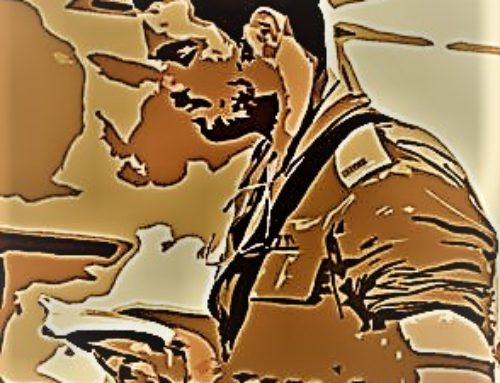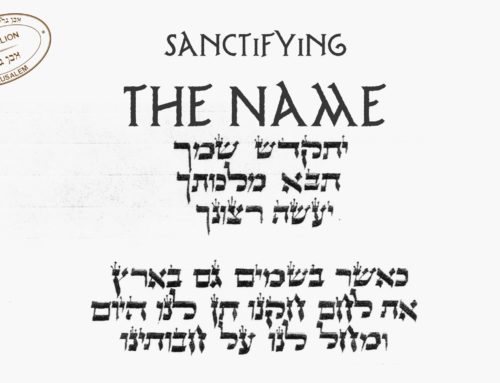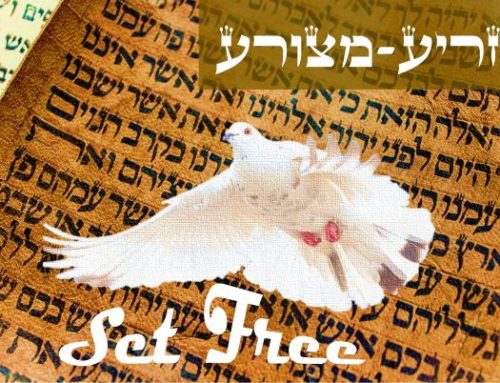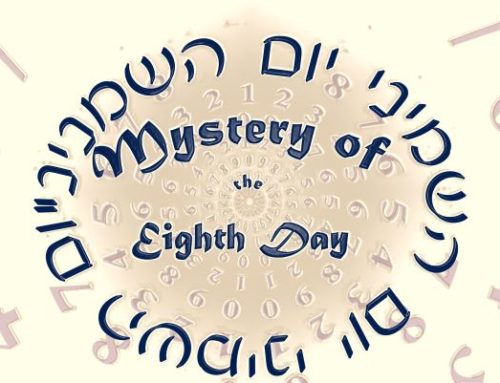“Is not My word like a fire?” says the Lord, And like a hammer that breaks the rock in pieces?” Jeremiah 23.29 NKJV
I had searched for the almost five hundred year-old book for years, and now one was before me. It was the Gospel of Matthew, 1557, in Hebrew and Latin by the Christian Hebraist Sebastian Munster. Within its pages I stumbled upon a mysterious engraving. I instantly recognized the Jewish tradition behind the artwork, but wondered why it had been placed in a late medieval Christian tome? A hammer struck a mountain like an anvil as its massive sparks flew outward. Facing the mountain, a man spoke words like tongues of fire. Immediately, I remembered an ancient Jewish story. This was a picture of Mount Sinai on the day God spoke the Ten Commandments – the day of Pentecost (Shavuot).
“With regard to the revelation at Sinai, Rabbi Yohanan said: What is the meaning of that which is written: “…It means that each and every uttereance that emerged from the mouth of the Almighty divided into seventy languages, a great host. And similarly, the school of Rabbi Yishmael taught with regard to the verse: “Behold, is My word not like fire, declares the Lord, and like a hammer breaks a stone into several fragments, so too, each and every utterance that emerged from the mouth of the Holy One, blessed be He, divided into seventy languages.”[1] B. Talmud, Shabbat 88b
It was fifty days since Passover when Israel arrived at the foot of Sinai. Though the command to observe the Feast of Shavuot or Pentecost was yet to be given, the timing was correct, and so traditionally, the giving of the Torah has been linked to this Feast of the Harvest.
As I write these words, I am thinking of the upcoming Pentecost or Feast of Shavuot. Perhaps you are facing a mountain, a mountain that you can only watch from a distance as God speaks, a mountain that requires the hammer of God’s voice to spark the tongues as of fire in your life. Be encouraged, the same Mighty One of Israel who spoke to Israel at Sinai is speaking to you today – in your language!
I. My Word Like a Fire
“Now all the people witnessed the thunderings, the lightning flashes, the sound of the trumpet, and the mountain smoking; and when the people saw it, they trembled and stood afar off.” Exodus 20.18 NKJV
Most English translations render kolot as thunder, and lapidim as lighting but the Young’s literal translation captures the Hebrew best – kolot are voices and lapidim are flames or torches. It was voices and flames which caused them to draw back. And yet the next verse makes it clear that this was not a natural phenomenon, but the voice or (voices) of God.
“Then they said to Moses, “You speak with us, and we will hear; but let not God speak with us, lest we die.” Exodus 20.19 NKJV
God’s voice is described in the plural as “voices” (kolot). Even the ancient Jewish commentaries, which I quoted above, struggled with this Pentecost (Shavuot) miracle – God speaking in more than one voice.
“…It means that each and every uttereance that emerged from the mouth of the Almighty divided into seventy languages, a great host.” Rabbi Yohanan, B. Tal. Shab.88b
From the beginning they understood that God was revealing Himself through this revelation not only to Israel but to all nations through Israel.
This miracle of flames and voices were repeated in Jerusalem two-thousand years ago as Elamites, Parthians, Arabs, and Asian pilgrims heard God speak in their own language! This time however, rather than withdraw, the crowd rushed forward to hear and see.
“Then they were all amazed and marveled, saying to one another, “Look, are not all these who speak Galileans? And how is it that we hear, each in our own language in which we were born? Parthians and Medes and Elamites, those dwelling in Mesopotamia, Judea and Cappadocia, Pontus and Asia, Phrygia and Pamphylia, Egypt and the parts of Libya adjoining Cyrene, visitors from Rome, both Jews and proselytes, Cretans and Arabs—we hear them speaking in our own tongues the wonderful works of God.” So they were all amazed and perplexed, saying to one another, “Whatever could this mean?” Acts 2.7-12 NKJV
The Pentecostal blessing of Sinai was repeated on Mt. Zion. Flames of fire and voices were seen on the mountain. This is the heritage of those who experience the Pentecostal outpouring.
Can God speak your language? Of course He can! But the better question you might ask is, does He want to speak your language? Not only can He, He is speaking even now to all men, languages, tribes and tongues the Good News of His Son, Yeshua, the Messiah of Israel.
II. My Word Like a Hammer
“Is not My word…like a hammer that breaks the rock in pieces?” Jeremiah 23.29 NKJV
As I contemplated the mysterious engraving within a Christian Medieval work, attempting to capture the Midrashic description of the Jewish commentary, I wondered why Christian Hebraist, Sebastian Munster, included it in his translation of Matthew. I am sure that his heart was burned to bring the Good News back to the tongue of Israel.
There is power in the hammer and fire of God’s word, but that word must be spoken in a language that can be understood. God speaking at Sinai caused the nation to tremble. His word spoken in various languages, and through the Peter on Mt. Zion at Pentecost caused the people to be “cut to the heart”, and cry out to Peter and the apostles, “Men and brethren, what shall we do?” Acts 2.37 NKJV
Jeremiah spoke of God’s word as a hammer and fire, contrasting the power of God’s word with the empty words of the prophets who falsely spoke in God’s name. Do we have the real flame and Word of the Lord demonstrated on these two occasions of Pentecost? When people hear the voice of God and see His fire, they will know that God is indeed in their midst. We need men and women of God who carry the true flame of Pentecost over their heads and speak with the true voice of the Spirit of God.
Conclusion
When the Pentecostal revivals began to spread among Christians in the early 20th century it was as powerful as occurred in Jerusalem on the day of Pentecost. Just as the flames settled upon the disciple’s heads in Jerusalem, so a new generation was empowered by the flame of God’s Holy Spirit to preach this Gospel in all the world. They were propelled by His Spirit to the various tribes and tongues with the Gospel. Where there was difficulty, God’s word broke through as a hammer. Where the forces of the enemy opposed the work, and hearts were hard, the hammer of God brought the flame outward.
Perhaps you are facing a mountain today. In this feast of Shavuot, this ancient day of Pentecost, be assured that if God has brought you to the mountain, it is for a purpose. His word is indeed like both “a fire and a hammer that breaks the rock in pieces”.
[1] “Shabbat 88b:3,” Sefaria, accessed May 15, 2021, https://www.sefaria.org.il/Shabbat.88b.3?vhe=William_Davidson_Edition_-_Vocalized_Aramaic&lang=en.
